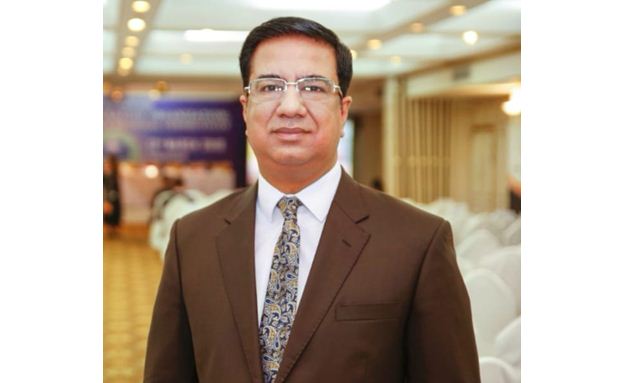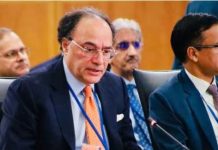Khalid Taimur Akram
Russia is among one of the fastest-growing economies in the world. Progressive and sustainable in its development goals, the country has been constructively working to bring nations together via an enhanced regional integration.
In contemporary times, Russia’s global outreach amid 2030 targets has been efficaciously adding for its socio-economic and political development. Russian foreign policy has been strengthening up to its present expansive phase. Moreover, its ambitions reflect through its foreign or regional policies, objectives and targets.
It relies on more advance and transforming goals. Since the adoption of 2030 goals, Russia has reaffirmed its commitment to fulfilling the targets and advanced its civil society through progressive measures. Russian President, His Excellency, Vladimir Putin has been stressing to actively work on the 2030 goals, cooperating with regional countries, and implementing joint progressive projects to ensure sustainable growth,foster economic integration, and upgraded industrial & transport infrastructure.
Moreover,Russia has been actively expanding its capacities through foreign assistance and facilitation to developing countries. Broader assistance is also one of the essential parts of the 2030 Agenda.Therefore, the studyessentially highlightsRussia’s startling policy framework for sustainable growth.The article also discusses the development strategies of Russia and its constructive input in sustainable development goals (SDGs).
The 2020 Strategy and May Decrees:
Russia has adopted a well-structured and cohesive policy framework. It can be envisagedthat the country under its visionary leadership will continue to pursue efficacious strategies for industrial development, environmental sustainability, technological transformation and other priorities over the decade. While discussing Russia’s beneficial adapted strategies, it is significant to highlight theMay Decrees.
In 2018, Russian President, His Excellency, Vladimir Putin signed a decree setting the national development targets to 2024. The documents set certain significant goals to be adopted for the socio-economic well-being of the state. The Decrees’ goals reflect some of the Sustainable Development Goals (SDG) as well.
The ambition is amid achieving broader goals, i.e., to ensure economic growth rates above the world’s level while keeping macroeconomic stability. The 2024 goals also include stabilizing and securing Information and Communications Technology (ICT) infrastructure for high-speed transmission, processing and storage of data bank easily accessible to all organizations and households.
In this aspect, the government is highly ambitious to establish and strengthen the digital economy’s legal regulation system, relying on a feasible approach in each domain.The 2017 program of ‘’Digital Economy of the Russian Federation” was designed for 2024. It is based on five aspects, i.e., normative regulation, robust education program, cybersecurity, establishing research competencies and Information Technology (IT) infrastructure. Most of these initiatives and broader targets have been already implemented to empower Russian progressive civil society. Russia’s National Project is an exceptional roadmap of state-driven investment across 12 major areas. The outlined five development goals are as follows:
- Maintaining the population (health and well-being)
- Providing a safe living environment
- Facilitating effective workforce
- Ensuring feasible business climate and enhancing entrepreneurship
- Technological transformation
Integration of Trilateral Dimensions of Sustainable Development and Policy Coherence:
A well-functioning, modern infrastructure is a central requirement for inclusive economic development and sustainable growth. The three dimensions, i.e., social, environmental and economic,have been reflected by a profound analysis of the May Decree. In this regard, Russian federal ministries and agencies are well coordinated with one another and with regional authorities to execute the adopted programs. Russia is a social state and always endorsed and encouraged Human and civil rights and freedoms. Since 2012, many trends have been advanced in Russia for sustainable development. The country has been working hard to achieve the Global SDGs by 2030. Therefore, the structural reforms have given new impetus to many sectors, especially the agriculture sector, to sustain food security. Therefore, as the world’s leading strategic hub and growing economy, Hunger is not an issue for Russia.According to the estimation of 2014 onwards, domestic agriculture capacity and production has been growing. Therefore, the country ensures not only its food security but also provide other countries with massive assistance. According to the Federal Customs Service of Russia (FCS), in 2018-2019, vegetable products’ exports were approximately$14.5 billion, weighing more than 69 million ton. This ratio indicates that the export in this sector would be further increased in the near future.
One of the Sustainable development targets is to maintain plant genetic resources for food and agriculture. In this aspect, Russia has strong expertise. The genetic diversity of seeds is preserved due to the Vavilov seed bank and Kuban genetic bank of seeds. Russia has the world collection of plant genetic resources, including 400 thousand samples. Therefore, theresearch institute, Vavilov Institute of Plant Industry (VIR) facilitates the production of hundreds of new species and hybrids annually. Moreover, Russia has been assisting other countries with shared knowledge through its huge expertise in the research and development (R&D) sector. Certain accomplishmentsby the Russian federation are pertinent to highlight in this area:
- Under the prudent and dynamic leadership of President Vladimir Putin, the federation has adopted robust legislative amendments ensuring societal well-being.
- Allocating special grants for the industrial composting of food waste.
- Providing pervasive assistance to farmers and rural communities and advancing the agriculture sector.
- Establishing warehouse logistics and the industrial processing of agricultural commodities, construction of storage networks.
- Mobilizing efforts to mitigate adverse impacts of climate change on socio, political and economic fabrics of society.
- Ensuring implementation of SDGs and maintaining low carbon footprints.
- Supporting funds that assist vulnerable social groups.
- Facilitating working group and leading commissions
- Monitoring the provision of societal well-being.
n Russia, one of the leading ideas of state policy is the modernization of education. Education provides easy access to education and improves its quality and efficiency. Furthermore, society’s demeanor to the future changes iscooperative and optimistic.Thereby, the society has welcomedtoextend the sphere of the educational system, focusing on the best foreign practices whileadhering to sustainable development goal four ‘quality education’.
Russia and Pakistan Broader Cooperation: Prospects for Achieving Sustainable Development Goals (SDGs):
Since the start of the new millennium, the strategic graph of Russia-Pakistan bilateral relations has followed an upwards trajectory. Russia’s outlook towards South Asia has dramatically evolved in the past decade. Moscow has highlighted its “Pivot to Asia” strategy as a central part of its Foreign Policy objectives. These objectives aim at diversifying diplomatic and economic relations with the Asian states. In the contemporary era, the global pendulum of the economy has shifted its course towards the Asian region.The contemporary geopolitical setting appears to be immensely encouraging in terms of the Russia-Pakistan relationship.
There are multiple sectors such as geo-economics, defense, information technology, counter-terrorism in which both countries can extend their cooperation and extract maximum benefits out of the alliance. Russia and Pakistan recognize each other’s geopolitical significance, especially regarding the Afghanistan conflict’s durable solution. Moreover, the China-Pakistan Economic Corridor (CPEC) provides yet another opportunity to strengthen Pak-Russia relations. Russia has announced its full support for the CPEC program.
By theabovementioned profound analysis of Russian global outreach and agenda 2030, it has been clear that the country can pave the way to attain common goals together and assist Pakistan in this regard. Therefore, Pakistan can extend its partnership with Russia to achieve global SDGs and add constructively into global alignments and cooperation. Collaboration to achieve the sustainable development goals would provide a new impetus for Pakistan and Russia to enhance their bilateral ties and foster people-to-people connectivity. The result-orientated policies by the visionary Russian leadershiphave ultimately proved to be a driving force for the amicable resolution of common global challenges and move towards regional cooperation.
The writer is the Executive Director, Center for Global & Strategic Studies (CGSS), Islamabad

















